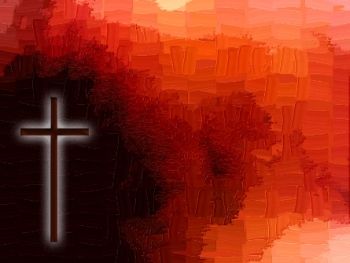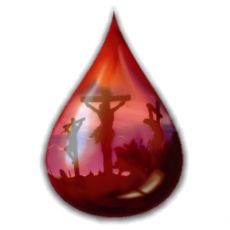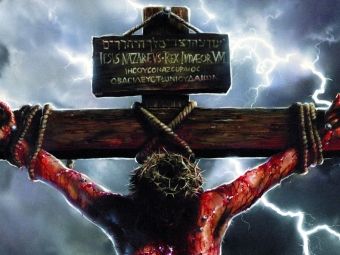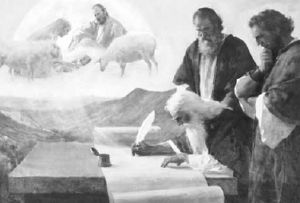
Publisher:
Bonnie King
CONTACT:
Newsroom@Salem-news.com
Advertising:
Adsales@Salem-news.com

~Truth~
~Justice~
~Peace~
TJP
Oct-21-2011 22:23

 TweetFollow @OregonNews
TweetFollow @OregonNews
The Blood of Christ
Kenneth G. Ramey Salem-News.comIsaiah’s Prophecy places him squarely in the camp of the Christian Cult.
 Courtesy: simple-ministries.com |
(PASO ROBLES, Calif.) - Christianity evolved as a plan by a Cult of Judaic sectarians convinced its philosophy of One God for All Nations should replace Judaism’s One God of the Jewish Nation.

Initially the Cult hoped to exalt Jehovah by making him the God of All Nations, a concept unacceptable to Jewish leaders who may have objected to being less than their God’s Chosen People. To them the Cult must have seemed audacious at best, and impossible in any event; obviously, the Jewish leadership miscalculated.
Except for the expansive Religions of the Book; Judaism’s Torah, the New Testament and Islam’s Koran, lesser communities are beholden to gods of parochial invention; symbolic and cerebral concoction both of which involve emotional and psychological processes that satisfy particular needs within their community.
Book Religions are different. Judaism leads the parade which the latter two follow. The Book of Isaiah presumes to be prophecy, but has a manifesto quality about it; a public written declaration of principles, policies, and objectives, especially one issued by a political movement such as a Cult intent on creating a new philosophical entity, the Catholic Church, but only after the Elders refused to allow Jehovah to be elevated to the supreme level of One God for All Nations “over which there could be no other,” as proposed by the Christian Cult.

Isaiah’s Prophecy places him squarely in the camp of the Christian Cult. The deity in his Prophecy is the philosophy of the Christian Cult. Isaiah expounds at length on the group’s ideology by putting words in the mouth of the “Lord,” - the Cult’s words - and even speaks for Jesus, chosen to be spokesman for the Cult-philosophy among the Jews as part of the plan to replace Judaism with a more universal religion; Catholicism. Still, the torah is the first Book, and Jehovah the first God which was at first embraced, then denounced after being rebuked, and Isaiah reflects this change. The Second Book of the three consists of two parts, the first written by Isaiah sixty to 100 years before the Gospels as is evident by the fact Isaiah’s Book appears in the Bible beginning on page 559 and the New Testament begins on page 757.
Islam’s Koran, the third and last of the Three Books evolved in the 7th Century with the emergence of Muhammad, the last of God’s prophets and therefore God’s last word. Jesus is not considered God by Islam nor the Son of God (Jehovah) but is respected as another prophet of lesser rank than Muhammad. The goal of dominance between Islam and Christianity have taken their toll for centuries, and continues to this day; nor has Judaism escaped unfazed: the NAZI Holocaust saw to that.
Isaiah gets the credit for his prophecy, but his work reflects the will of the Cult and its emergence as “the Lord” in straight-forward terms. [Isaiah: 49;1-3] has Jesus speak to God [the Cult] followed immediately [49; 4-forward] by the Cult in a reversal of roles. In [49; 1-3] Jesus is presented as saying poetically with additions:

“The Lord called me from the womb,” [the Jewish community]
“from the body [politic] of my mother he named my name.”
“He made my mouth like a sharp sword” . . . [he taught me what to say]
“In his quiver he hid me away” [during the period of my instruction].
“And he said to me, you are my servant, Israel, in whom I will be glorified.”
Isaiah speaks of the “Essential Man “ (Jesus) as arriving on the scene in little more than a year,” After his indoctrination? and his Prophecy, as dictated by the Cult, contains metaphors of mysterious and supposed miracles performed by Jesus that dissolve in light of logic and attention to detail. Isaiah’s text omits much of what was added in the Gospel versions much later. Reference to “Jesus said” in all books of the New Testament should be taken with a grain of salt rather than fact, if it doesn’t appear in Isaiah.
The significance of the phrase “The Blood of Christ,” for example, is confounding even to many devoted believers, which makes it a worthy subject for explanation. What does it mean to say “Christ died for our sins?” In Catholic (post sacrifice) terms of the New Testament, a sinner is anyone who exists outside the realm of Catholic dogma; that is, we are sinners if we have thoughts of our own that don’t embrace what the Church tells us to believe. So, how exactly does Jesus’ sacrifice involve us? The answer to the quandary is detectable if followed from [Isaiah: 49; 1-3-above] that describes the arrival and training of Jesus by the Cult, and [Isaiah: 53; entire - edited] that describes Jesus’ crucifixion with precision, decades prior to the Gospels, when Isaiah says “He poured out his soul to death and was numbered with transgressors as King of the Jews and made intercession for transgressors by saying, Forgive them Lord for they know not what they do.”
What Isaiah supposedly is prophesying is so exact, even to defining details, one might conclude that the role of the Christ, including how he should die, was conceived in advance, or was performed on the spot. If the why can be known, so too might be the significance of his blood. The Gospels tell the rest of the story.
Jesus’ calling and his preliminary training was followed by a series of tests to assure the Cult of Jesus’ commitment to his role before being named the Christ. They consisted of several scenarios beginning with his symbolic baptism by John the Baptist, after which baptism became the act by which new Christians and mere babes were cemented to the faith. Next Jesus was returned to the wilderness, the Jewish community of his birth, for forty days to test his dedication to worship only the God of the Cult; not Jehovah. Jesus next was provided with disciples and was sent among the Jews to preach and to draw attention to himself, succeeding in causing Jewish Elders to view him as a rabble rouser, and non-conformist, as the Cult expected and desired.
Persistent behavior patterns and habitual thinking are the result of ingrained tendencies that make people reluctant to change their minds, especially those who are accustomed to accepting what is “given” them to believe in silence and without question; even [Isaiah: 30; 15] says, “in quietness and in trust shall be your strength.” Today’s Evangelists have laid claim to that concept, and insist that those who abide by their preachments are the “true Christians;” and intellectuals who doubt or question before committing to a faith are instruments of the Devil; Jesus wavered only once and that was on the Mt. of Olives in Jerusalem.
When Jesus is spoken of in the Bible as having “said something” it is likely he did not. For Jesus is referred to in Isaiah’s Prophecy sixty to one-hundred years before the Gospel writers who had no first hand information but the words of Cult members; i.e., hearsay, whose purpose was to concoct for others a story to promote Jesus as the invisible New Testament God who is controlled by the Vatican that elects popes to do it bidding.
When Jesus supposedly asked his disciples, following the Sermon on the Mount, “who do the people say that I am?” All but Peter offered a variety of answers, none of them correct, so Jesus asked, “But who do you say that I am?” and Peter alone identified Jesus as the Christ [Mark: 7; 2-30] in a scripted scenario because Jesus was not named Christ until after he was in Jerusalem; and when it was time for Jesus to go to Jerusalem, he described to his disciples precisely what would happen after he and they arrived.
Jesus arrived in Jerusalem riding on an untamed ass, according the Gospels, as humbly he received the accolades of believers who spread palm fronds before him in a celebration that today is referred to as Palm Sunday. Jesus was crucified the Friday following; Good Friday, and supposedly was resurrected, at least in spirit, on Easter Sunday, following the first full moon after the vernal equinox; the first day of Spring, the new planting season, and the start of a new beginning; metaphors suitable to the culture of the time.
In Jerusalem, Jesus’ humanity failed him, when on the Mount of Olives he prayed the cup of death be removed, but an angel of the Lord reassured Jesus who recommitted to his obligation to die according to plan, a scene which has since been portrayed in painting and verbally as his Transfiguration from his humanity to a spiritual being, another Gospel rendition not mentioned by Isaiah, as is true of most, if not all, of what follows.
Afterward, in Bethany, while he sat at table, a woman anointed him with oil for burial that earned for him the title of the “Christ” from the Greek; Khristos: christen; to install somebody ceremonially, and give him a new name. Perhaps also on the Mt. of Olives, or at Bethany, the title of “King of the Jews” was assigned to him by the Cult as an essential part of the symbolism intended to bring Christianity to fruition. The next act involved Judas Iscariot and his purported betrayal.
Judas’ name is similar to Judaism, Judaic, and Judaize [to conform to doctrines, observances, or methods of the Jews], and suggests that his name was intended to promote an idea that painted him as a traitor to Christianity, but who seems to have been a member of the cast devoted to its fulfillment. The recent discovery of the Judas Gospel confirms what should have been known from Isaiah when Jesus, during The Last Supper, told Judas to go and do what he must, the object of which seems not to have been in doubt. When Judas was gone, and in apparent anticipation of the expected, Jesus commented to the remaining disciples that his ‘end is near when he will be glorified.’
Jesus, as Christ, awaited the next scene at Gethsemane where he was identified by Judas, and a disciple is said to have used a sword to cut off the ear of the slave of the high priest. Isaiah describes the tongue as the "sword of the mouth," an instrument of Christian persuasion, not of steel. Jesus admonished his disciple to put away his sword, was promptly arrested, and soon after was presented before Pilate.
Pilate asked him about the title, “King of the Jews,” and Jesus responded obliquely saying, "My kingdom is not of this world," a line likely given him to recite by the Cult. Pilate could find no fault with Jesus, washed his hands of responsibility, and turned Jesus over to the Jews for disposition. But the scene makes sense only if the proceedings were orchestrated by the Cult whose object was that Jesus must die.
If Jesus' Kingdom was not of the Jewish Community, why would he have been branded "King of the Jews," by Jews?" Why, once it was determined he should be crucified, was he crowned with thorns, and by whom? Isaiah's definition of the wilderness, let us not forget, was the Jewish community, a wasteland of mental-infertility overgrown with weeds, briars, thorns, and decay. Jesus was committed fully to the Christian cause and his role in it as “King of the Jews.” The crown of thorns, His crucifixion and burial, symbolically represented the death of the Old and the Beginning of a New Order within which, metaphorically speaking, Immortality reigns supreme by the Grace of God, and where outside the Christian Community, Immortal life is impossible. Roman Catholicism expanded by keeping followers ignorant. a fact Evangelicals take to heart.
The plot, as in any good play, ends by wrapping up all the loose ends. Those who established the Catholic Church, the presumed Resurrected Body of Christ, on the Rock of St. Peter’s Faith using Jesus’ title [Christ] to identify their new religion had brought their plan to fruition, finally.
The “The Blood of Christ” is resolved in the understanding that it was shed for, and holds the promise of Life-everlasting to, those who partake of the Eucharist which of His Grace is offered to the elect, but is denied reprobates; the damned who refuse to abide by Christian authority.
The Protestant Reformation was successful in the 18th Century when the Counter Reformation of The Roman See, after three centuries of death and destruction by both factions, finally admitted defeat. Today, the American Religious Right,” Evangelical Holy See” of the Republican Party, seeks to push the envelope of its misguided plan to hasten the Second Coming of Christ when Christianity will force its will on all who must either submit or suffer the consequence. Ref the last verse of Isaiah.
Unity through Diversity, with mutual respect for all, will produce better and longer-lasting results than absolute obedience to absolute authority such as the Religious Right and the Evangelical Holy See of the Republican Party seeks to achieve at the expense of logic and reason.
Concluding Thoughts
So, President Obama is beginning to act as America’s Commander in Chief by leaving a reasonable contingent in Iraq as guard of our Consulate, and by bringing home the last vestige of the 46,000 troops by the end of the year.
It is an act consistent with the will of the majority of Americans, but contrary to the will of Republicans generally and the candidates seeking the Republican nomination of its Evangelical Holy See that controls the Party in its own interest.
Rev. Jeffress of Dallas mega-fame has already embraced Rick Perry for the presidency at the same time he renounced Mitt Romney who, as a Mormon, Jeffress considers unsuitable for the Office because he belongs to a cult which Jeffrees and his constituents, who are already being welcomed to the fold, would not be able to control completely as President.
And, lo, in the Las Vegas debate, not attended by Jon Huntsman, the other Mormon, the other candidates, most if not all of whom are of evangelical persuasion, took turns abusing Mr. Romney in hope of gaining an advantage if he dropped out. I doubt he will; Jon Huntsman perhaps, but Jon impresses me.
In my article, “The Blood of Christ,” above, I point out that as the second of the Three Religious Books - Judaism being the first - it was a Christian Cult whose plan succeeded in overcoming Judaic misgivings to establish the Catholic Church by means audacious and inventive.
The Book of Isaiah, pp.557 in the Bible, forward, set the stage for the Gospels of the New Testament sixty to 100 years after. I trust Isaiah as the most reliable version, for if it isn’t in the original, it probably didn’t happen as presented in the New Testament which appears to be a fairy tale. Political Evangelicals trust emphatically, and insist the candidates must too. In like fashion, they interpret the Constitution to fit their fancy, then insist their followers follow their lead.
When Jesus entered Jerusalem he was riding an untamed ass unaware, it was said, of the divinity it bore: so-called Christians who accept as gospel the false preachments of mega-church and Political evangelicals are no more aware than was the ass Jesus rode of what Christianity really is all about. Hopefully, my article will make them more astute. KR
 Kenneth G. Ramey, Salem-News.com's Religion and Philosophy Writer, confronts the hard issues of politics and religion from a logical point of view that combines interesting insight with history into the truth, or lack thereof, that underlies the strengths and weaknesses of the Religious Right’s determination to use American politics for its own misguided, or selfish, interest. It’s rare for a writer to balance his writing between religious values and the secular guarantees of the Constitution and the Bill of Rights with the knowledge that Ken possesses, and to do it so effectively.
Kenneth G. Ramey, Salem-News.com's Religion and Philosophy Writer, confronts the hard issues of politics and religion from a logical point of view that combines interesting insight with history into the truth, or lack thereof, that underlies the strengths and weaknesses of the Religious Right’s determination to use American politics for its own misguided, or selfish, interest. It’s rare for a writer to balance his writing between religious values and the secular guarantees of the Constitution and the Bill of Rights with the knowledge that Ken possesses, and to do it so effectively.
Ken was born in Minnesota but was raised in California since 1932. He is the youngest of four boys raised by his mother alone during the dark years of the Great Depression. He Graduated from SFSU in the 1970s when in his mid-forties, majoring in Spanish North American History, and added three years of post-graduate study, much of it in Philosophy and Religion. We live at a critical time in history and believe Ken's views represent the view of many who are tired of the commercialism and false interpretations about religion today. Watch for Ken's articles on religion, philosophy, politics and history. View articles written by Kenneth G. Ramey You can email Ken at: darken1@sbcglobal.net

googlec507860f6901db00.html
Salem-News.com:



Terms of Service | Privacy Policy
All comments and messages are approved by people and self promotional links or unacceptable comments are denied.
Henok Alambo June 10, 2016 10:40 pm (Pacific time)
Good work
[Return to Top]©2025 Salem-News.com. All opinions expressed in this article are those of the author and do not necessarily reflect those of Salem-News.com.